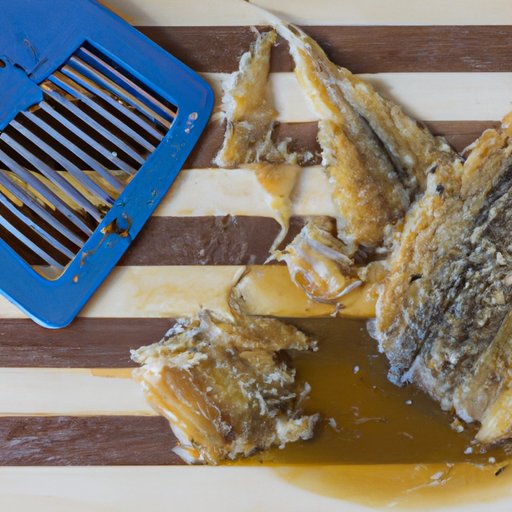
I. Introduction
Catfish is a popular fish that can be found in freshwater bodies around the world. For many fishing enthusiasts, catching a catfish is thrilling, and filleting it can be incredibly satisfying. Filleting a catfish is a necessary skill that every angler should acquire if they want to enjoy their catch. In this article, we will discuss the importance of knowing how to fillet a catfish, introduce the necessary fishing gear, provide different methods for filleting a catfish, and offer pro tips to make the process much easier. We will also provide a delicious recipe that you can make with the filleted catfish.
II. Introducing the Necessary Fishing Gear
Before we delve into the process of filleting a catfish, it’s essential to have the necessary tools in your arsenal to make the job easier. Here are some of the tools you’ll need:
1. Fillet Knife: A fillet knife is an essential tool in filleting fish. It has a long, thin, and flexible blade that can easily slide through the fish’s flesh and bones.
2. Cutting Board: A clean and flat cutting board will provide a steady surface to fillet the fish.
3. Pliers: Pliers are handy tools that can help you grip the fish tightly and remove any remaining bones with precision.
III. Different Methods to Fillet a Catfish
There are various methods to fillet a catfish, depending on the size of the fish and whether or not you want to remove the skin. Here are some of the methods:
1. Hand Fillet: This method is suitable for smaller fish. To do this, you must first cut off the head, then slice the fish along the spine and lift out the fillet. This method is quicker and simpler than other methods.
2. Skin-On Fillet: This method involves leaving the skin on the fillet. The key to this method is to make sure that you get as much meat as possible without damaging the skin. This method is useful when cooking certain catfish recipes.
3. Skin-Off Fillet: This method means removing the skin from the fish. To achieve this, you must first cut through the fish’s skin along the backbone and then slice the meat off the skin. This method is useful for larger fish, as it makes removing the fillet simpler.
IV. Step by Step Guide
Step 1: Start by cleaning the catfish under running water and pat down the fish with a paper towel.
Step 2: Secure the fish to a clean and flat cutting board.
Step 3: Place the fillet knife behind the gills and align the blade against the fish’s spine. Start cutting along the fish’s spine towards the tail.
Step 4: When you reach the end of the fillet, cut through the spine to separate the fillet from the tail. Repeat on the other side of the fish.
Step 5: Remove the skin from catfish by cutting through the skin and flesh at a shallow angle. Use the pliers to grip the skin and peel it carefully away from the fillet.
V. DIY Tips for Filleting Catfish
1. Sharp knives: A sharp fillet knife will make filleting much more manageable. A dull knife can make it more challenging to cut through the fish’s bones and skin. Keep your knife sharpened regularly.
2. Bone Separation: Run your fingers along the fillet to feel for any stray bones that may have been left behind. Use your pliers to grip each bone firmly at the tip and pull them out carefully.
3. Easy Clean-up: Cover your cutting board with a plastic bag or newspaper before you start filleting. This will make cleaning up any fish scraps and blood easier.
VI. Delicious Recipe that can be Made with Filleted Catfish
Crispy Fried Catfish:
Ingredients:
- 2 lbs of fresh catfish fillets
- 1 cup of flour
- 1 tsp of salt
- 1 tsp of pepper
- 1 pinch of cayenne pepper
- 1 egg, beaten
- 2 cups of vegetable oil
Instructions:
Step 1: Cut the filleted catfish into 3-4 inch pieces.
Step 2: Mix the flour, salt, pepper, and cayenne pepper in a bowl.
Step 3: Dip the fish pieces into the egg mixture and then coat with the flour mixture.
Step 4: Heat the vegetable oil in a large skillet over medium-high heat.
Step 5: Fry the fish pieces until cooked and the coating is golden brown (around 5-7 minutes).
Step 6: Remove the fish pieces from the skillet and place them on a paper towel to drain off excess oil.
VII. Conclusion
Learning how to fillet a catfish is a skill every angler should acquire to make the most of the catch. It isn’t as hard as it may seem, but it requires practice and patience. Experiment with different methods and find what works best for you. With the tips provided in this article, you’ll be well on your way to filleting catfish like a pro. And with this tasty recipe, you can now enjoy your catch in a mouth-watering dish.





